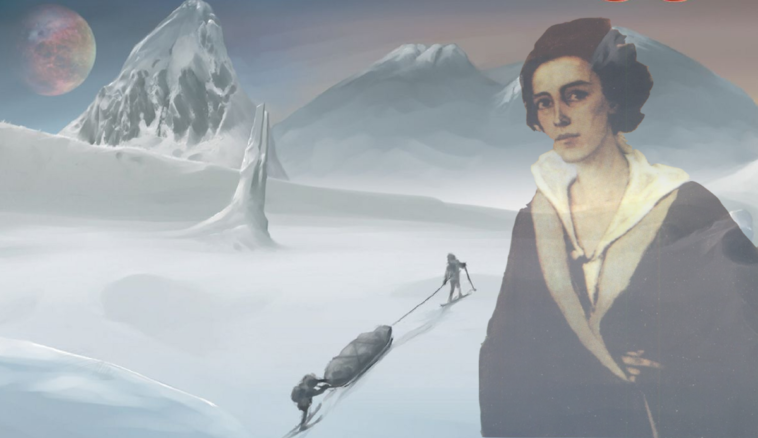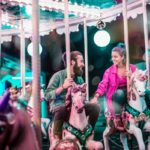h2>Dating : ORLANDO 3028
“Orlando leapt as if she had been violently struck on the head. Ten times she was struck. In fact it was ten o’clock in the morning. It was the eleventh of October. It was [3028].” (Woolf) Overwhelmed with an urgency to dress herself, Orlando sprang to the now antediluvian dresser. She had risen from a millennia long coma and was far too bewildered to consider the oddity of the grey, loose-fitting, robe-like garment. Orlando was only slightly conscious of how perfectly and comfortably it fit her body. But comfort was overcome by fear, and fear by panic, “for what more terrifying revelation can there be than that it is the present moment?” (Woolf) And it was a present so far removed from anything Orlando had known.
“Orlando leapt as if she had been violently struck on the head. Ten times she was struck. In fact it was ten o’clock in the morning. It was the eleventh of October. It was [3028].” (Woolf) Overwhelmed with an urgency to dress herself, Orlando sprang to the now antediluvian dresser. She had risen from a millennia long coma and was far too bewildered to consider the oddity of the grey, loose-fitting, robe-like garment. Orlando was only slightly conscious of how perfectly and comfortably it fit her body. But comfort was overcome by fear, and fear by panic, “for what more terrifying revelation can there be than that it is the present moment?” (Woolf) And it was a present so far removed from anything Orlando had known.
In the time since Constantinople was overtaken by its locals and Orlando had fled, the great city had evaporated, and following it, every empire Orlando had ever known. England itself was nothing but an archaic memory from a time where nations were still the fundamental unit of the diplomatic arena. In the present, the planet itself had become the fundamental unit. Orlando was to be sent on a diplomatic mission as a consul to “the planet Gethen” (Le Guin) to convince the Gethenians to join an intergalactic commonwealth, the “Ekumen” (Le Guin), composed of most planets in the known universe. But more extraordinary to Orlando was that she, a woman, was allowed back into her political office. ”In this way, regarding men and women, the world has changed the most,” thought Orlando to herself as she was debriefed by a small, metal orb levitating in front of her.
”In this way, regarding men and women, the world has changed the most,” thought Orlando to herself as she was debriefed by a small, metal orb levitating in front of her.
“‘The very fabric of life now,’ she thought as she rose, ‘Is magic. In the eighteenth century we knew how everything was done; but here [I am to travel to the stars]. So my belief in magic returns.’” (Woolf) And yet Orlando couldn’t help but think back to her time in England, playing with the shrunken head her ancestors had procured from Africa so long ago. For had anything really changed? Or was she merely traveling to Gethen to gather heads to hang from rafters as her fathers had done? Were there still the civilized and the savages? What would she find in Gethen?
With doubt still in the back of her mind, Orlando boarded her starship and launched into space at speeds beyond her comprehension. Accustomed to time passing, Orlando slipped easily into a trance-like state to wait for her arrival at Gethen.
Unbeknownst to Orlando, many things were happening in the universe. Archduke Harry had fallen madly in love with an arthropodal alien princess who had married him and then, in accordance with proper arthropodal etiquette, promptly consumed and digested the Archduke. At the same time, Marmaduke Shelmerdine was steadily growing in notoriety as a space pirate and Sir Nicholas Greene was publishing an article titled, “Top Ten Reasons Why Modern Literature Has Been Ruined By Clickbait Journalism.”
Archduke Harry had fallen madly in love with an arthropodal alien princess who had married him and then, in accordance with proper arthropodal etiquette, promptly consumed and digested the Archduke.
Also unbeknownst to Orlando, Gethen was unlike any other planet in the Ekumen. The Gethenians were unique in that they were entirely androgynous. It was not that they were intersex, or just didn’t care about gender, but that the default state of a Gethenian was one of no physical sex whatsoever. Only during the reproductive process would a Gethenian manifest sexual organs, and which one was their own choice. Like Orlando, the average Gethenian experienced life both as a male and female, usually for only a few days a month. The concept of gender roles was non-existent on Gethen. In fact, the Gethenians considered anyone whose gender was permanent, sexually deviant.
And all of this was unbeknownst to Orlando. Upon arriving at Gethen and arising from her slumber, Orlando yawned. She stepped off her ship and was brought directly into a lobby-like room to wait for her appointment with the King of Gethen. She was accompanied by a peculiar Gethenian who said softly that his name was “Estraven” (Le Guin). Estraven had a cold, dark stare and Orlando subconsciously decided that he was a man. She was offended by his lack of courtesy. She decided that, were she a man, “she should have been making the motions of drinking and smoking over an empty coffee” (Woolf) and making conversation. She had come to enjoy the respectful simping of antique Englishmen, and was wholly unsettled by Estraven.
But Orlando did not yet realize the extent to which this world was foreign to her. Orlando had been both he and she and loved both him and her, but had never escaped from the distinction entirely. In fact, more than most, Orlando’s life was defined by Orlando current gender. Although Orlando had never fundamentally changed with her gender, her place in society, and the way others treated her, had changed. Naturally, Orlando was forced to adopt some of these changes into her identity. Because of this, unlike the Gethenians, Orlando still embraced the different roles of each gender. Orlando still asked herself, “which is the greater ecstasy? The man’s or the woman’s?” (Woolf) And still could not decide.
She had come to enjoy the respectful simping of antique Englishmen, and was wholly unsettled by Estraven.
So when Orlando asked Estraven to tell her about Gethen, and Estraven, who looked at Orlando with pity, explained Gethenian society, Orlando’s identity was shaken more intensely than ever before. Suddenly everything she had ever done was in question. Her pursuit of Sasha and the heartbreak following, her marriage to Shel, her social status, and her poetry especially had been, in some way or another, done because Orlando was a man or Orlando was a woman.
She could not accept the Gethenian’s way immediately. Orlando, now grateful that Estraven was not trying to make conversation, thought to herself, “a man wants his virility regarded. A woman wants her femininity appreciated, however indirect and subtle the indications of regard and appreciation. [Here on Gethen] one is respected and judged only as a human being. It is an appalling experience.” (Le Guin) And indeed Orlando was appalled. For how was one to treat another on this world? How did one expect to be treated themselves? And why was Estraven so cold to Orlando? Without her gender to help navigate society, Orlando did not know what to do.
After taking a few moments to recover, now hopeful as well as terrified, Orlando whispered to herself, ‘It is the goose, The wild goose…’ (Woolf). For Orlando realized that Gethen may have been what she was searching for all along. And in a vision, Orlando “flung [herself] — there was a passion in his movements which deserves the word — on the earth at the foot of the oak tree.” (Woolf) And just as she had once imagined the oak tree to be “the back of a great horse that [she] was riding, or the deck of a tumbling ship,” (Woolf) she imagined herself, Orlando, to be anything, freed entirely from the expectations of whichever form her current body decided to take. She realized that her poem “The Oak Tree” was indeed the only poem that had survived the turbulence of her life, for it was about her experience as a child, before Orlando had been branded “Lord” or “Lady”.
It was at this moment when Estraven spoke, “Come, it is time to see the king.”
And Orlando, with open eyes, stood up. “No [non-Gethenian] being, since the world began, [had] ever looked more ravishing,” (Woolf) for Orlando was no longer a woman or a man. As Orlando walked proudly into the king’s court, wearing the synthetic, colorless, formless, futuristic gown, Orlando was, for the first time, just Orlando, and that was all Orlando was.
Orlando was, for the first time, just Orlando, and that was all Orlando was.



